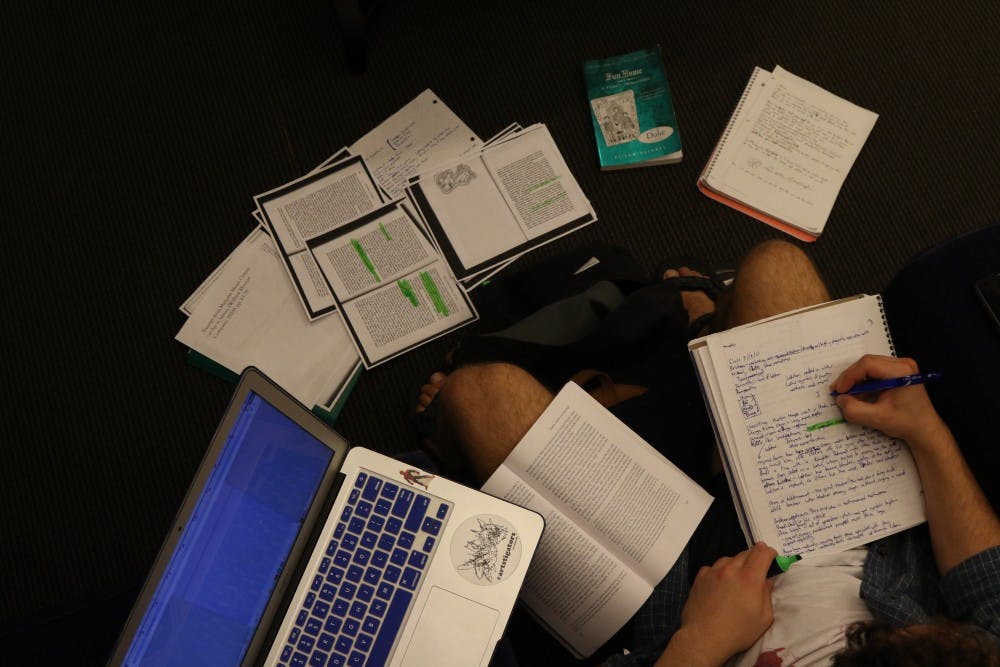You walk into class on the day of the midterm and slide into your usual seat. The bags under your eyes are more pronounced than usual after the many hours you spent cramming last night in Perkins. Hiding your sweaty palms under your thighs, you lean over to the person sitting next to you. “I didn’t study at all for this.”
If you haven’t been this person, you’ve definitely heard this phrase plenty of times. Duke students can be habitual liars when it comes to our academic habits. We say we know nothing when we know plenty and claim we’re going to fail when we’re shooting for an A. Why?
It’s no secret that Duke’s academic environment is highly competitive. But what people often fail to recognize is how much of our personal value we place in our academic success, especially relative to the success of our peers. Imposter syndrome—the feeling that you’re the only one here that doesn’t belong—permeates most corners of campus in one form or another. In the face of crippling insecurity, this feeling forces us to prove that we deserve to be here.
In order to prove ourselves, we can’t just be smart—we have to be smarter than those around us. The problem, however, is that this won’t always be the case. In classes with such high-achieving students, we can’t always snag a spot in the top tier. Consequently, we seek alternative methods to appear to fit in.
Lying about how much we study, then, becomes much more appealing. Regardless of how much you actually study (and let’s be honest, most of us are working our butts off), you can manipulate your speech to maximize your reputational gain. If you say you didn’t study for an exam and then end up acing it, it’ll seem like you’re naturally brilliant. And if you bomb the exam, it’ll make sense, because for all anyone else knows, you barely tried anyways. Of course, if you had put in the effort, you could’ve killed it.
These mind games are merely tools of self-preservation. Most of us do truly value hard work and determination, but at the end of the day, being a genius is better than being a hard worker, and being apathetic is better than being dumb. By maintaining an illusion of innate, nonchalant intellect, we assert to everyone else that we do belong at Duke. Even when we don’t feel like it ourselves.
Take the recent case of research fraud at Duke. Erin Potts-Kant, a Duke Health researcher, allegedly falsified data on a whopping 12 papers, and now the entire university is paying for it. Circumstantially it’s an outlier, but the possible motives behind the forged data are all too common. Regardless of whatever is going on behind the scenes, the most important thing is maintaining an illusion of perfection. Many of us will do whatever it takes to keep that up—and, like Duke’s $112.5 million settlement, the costs can be exorbitant.
Besides being incredibly damaging to our self-images, this philosophy is destructive to every other student who comes in contact with it. It raises the bar so unreasonably high—even geniuses have to work hard sometimes, after all—that it’s extremely difficult to ever feel smart enough. At that point, the student has two choices: either wallow in their insecurities or start feigning academic apathy themselves. And so the cycle continues.
There is, however, a hidden third option. The only way for us to actually feel good enough—without being cocky—is to start being honest with each other. None of us can get by without working at all, so we might as well stop pretending like we can. Even the people you think are perfect and brilliant have incredibly complex lives and are all struggling through their academic pursuits in their own ways. What if they chose not to hide those struggles? And—because for someone, you are that perfect person—what if you didn’t hide your own?
As much as we fear it, vulnerability is rarely considered weakness. The people I admire most are those who are unabashedly themselves, who don’t feel the need to pretend or conform. In fact, their shameless sincerity makes me feel better about myself. And because I, too, ultimately want to make other people happy, I can choose to sacrifice the illusion of perfection I’ve created to help others break down their own walls. If we all tried to cultivate a candid academic culture, maybe this school would feel a little less cutthroat.
But in all seriousness, if one more person tells me they haven’t studied at all for the exam I’m about to take, I’m going to lose it.
Rebecca Torrence is a Trinity sophomore. Her column usually runs on alternate Wednesdays.
Get The Chronicle straight to your inbox
Signup for our weekly newsletter. Cancel at any time.

